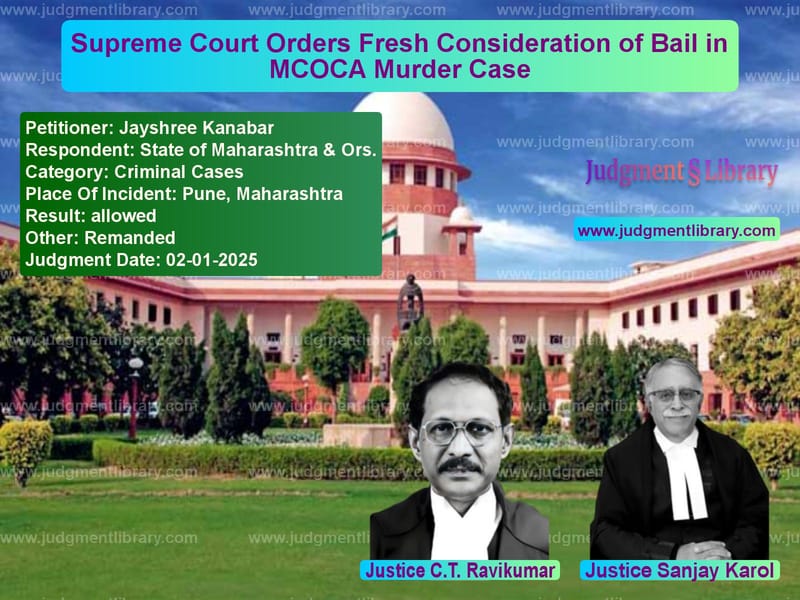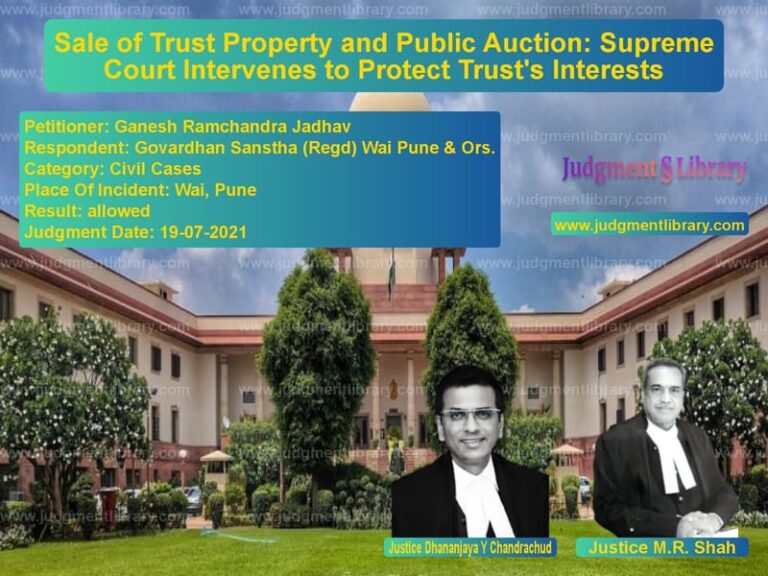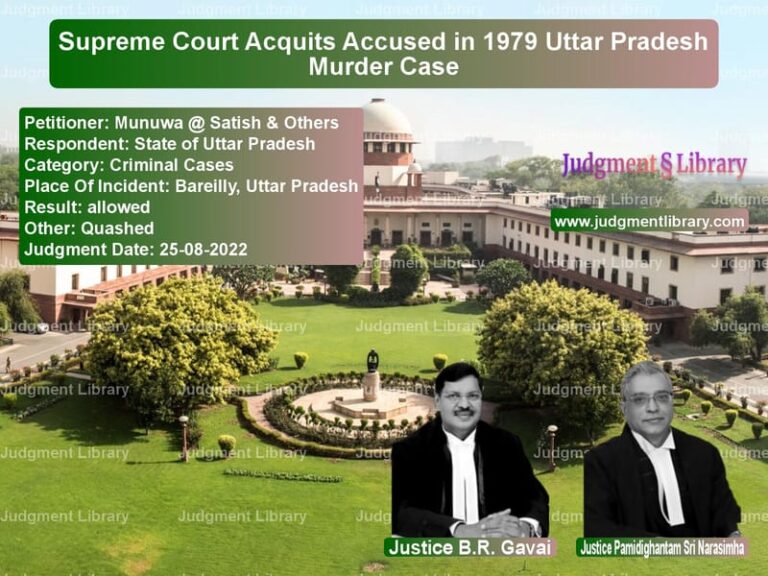Supreme Court Orders Fresh Consideration of Bail in MCOCA Murder Case
The Supreme Court of India recently delivered an important judgment in the case of Jayshree Kanabar vs. State of Maharashtra & Ors., addressing the grant of bail in a murder case registered under the Maharashtra Control of Organized Crime Act (MCOCA), 1999. The case involved the killing of Rajesh Haridas Kanabar over a longstanding property dispute, and the appellant, the victim’s widow, sought cancellation of bail granted to two accused persons. The Supreme Court found that the High Court had erred in granting bail without properly considering the legal requirements under MCOCA, and it directed a fresh hearing.
Background of the Case
The case originated from Crime No. 413/2020, registered at Bundgarden Police Station, Pune. The accused persons were charged under:
- Sections 320, 120B, 201, and 212 of the Indian Penal Code (IPC), 1860
- Sections 3/25 of the Arms Act, 1959
- Sections 37(1)(3) read with Section 135 of the Maharashtra Police Act, 1951
- Sections 3(1)(ii), 3(2), and 3(4) of the Maharashtra Control of Organized Crime Act (MCOCA), 1999
The prosecution alleged that the deceased, Rajesh Kanabar, was embroiled in a civil dispute over property with the accused persons. On October 5, 2020, after a revenue proceeding at the Pune Collector’s office, Rajesh Kanabar was shot dead by accused Hasmukh Patel (Accused No. 4) using a country-made pistol.
Read also: https://judgmentlibrary.com/supreme-court-ruling-on-proclaimed-offender-status-and-section-174a-ipc/
Petitioner’s Arguments
The petitioner, represented by Senior Counsel, contended that:
- The High Court had conducted a mini-trial while granting bail and had gone beyond the permissible scope of bail hearings.
- The High Court made findings on the lack of involvement of accused persons without a full trial, prejudicing the prosecution.
- The High Court failed to consider Section 21(4) of MCOCA, which imposes strict conditions for granting bail.
- Observations made by the High Court about the accused not being in contact with the gang leader compromised the fairness of the trial.
Respondent’s Arguments
The respondents, represented by their counsel, countered:
- The MCOCA charges were added later to prevent the accused from obtaining bail.
- The accused had already spent three years in custody before bail was granted.
- The bail conditions were strict, ensuring that the accused would not evade trial.
- The High Court’s observations did not affect the trial, as the prosecution could still present its evidence.
Observations of the Supreme Court
The Supreme Court Bench, comprising Justices C.T. Ravikumar and Sanjay Karol, found several flaws in the High Court’s order:
Failure to Apply MCOCA Bail Conditions
“Since MCOCA is involved in this case, the accused could not have sought bail under Section 439 Cr.P.C. The High Court failed to apply the strict conditions mandated under Section 21(4) of MCOCA.”
Prejudging the Case
“The High Court went beyond its jurisdiction by making findings on the merits of the case, concluding that Accused Nos. 1 and 2 had no role in the murder, thereby compromising the fairness of the trial.”
High Court’s Improper Observations
The Supreme Court highlighted problematic findings made by the High Court:
- “Accused Nos. 1 and 2 did not directly or indirectly deal with the deceased at any point of time.”
- “There is no evidence even to suggest that Accused Nos. 1 and 2 were directly or indirectly in contact with the gang leader.”
- “The presence of accused persons at the Collector’s office was for legal purposes and had no connection to the murder.”
- “The prosecution witnesses have not attributed any specific role to Accused Nos. 1 and 2.”
Failure to Consider MCOCA’s Stringent Bail Provisions
“When an accused is charged under MCOCA, courts must adhere to the stringent conditions imposed under Section 21(4). The High Court failed to do so.”
Final Judgment
The Supreme Court set aside the High Court’s bail order, stating:
“In view of the observations made and the absence of proper consideration of MCOCA’s strict bail conditions, the matter must be remanded to the High Court for fresh consideration.”
Directions Issued
- The case was remanded to the High Court for a fresh hearing.
- The High Court was directed to decide the bail applications strictly as per Section 21(4) of MCOCA.
- The accused were allowed to remain on bail till the High Court’s final decision.
- The High Court was instructed to decide the matter within one month.
Impact of the Judgment
This judgment reinforces the strict bail conditions under MCOCA and ensures that courts do not conduct a mini-trial at the bail stage. The ruling serves as a reminder that:
- Courts must follow the statutory conditions imposed by special laws like MCOCA.
- Bail hearings should not involve detailed findings that could prejudice the trial.
- Judicial discretion must be exercised within the legal framework without encroaching on the trial process.
Conclusion
The case of Jayshree Kanabar vs. State of Maharashtra & Ors. is a landmark ruling that safeguards the integrity of criminal trials. By setting aside the improper bail order, the Supreme Court has ensured that the accused are subjected to fair and rigorous scrutiny under MCOCA before being granted bail. The decision emphasizes the role of higher courts in preventing procedural lapses and upholding justice.
Petitioner Name: Jayshree Kanabar.Respondent Name: State of Maharashtra & Ors..Judgment By: Justice C.T. Ravikumar, Justice Sanjay Karol.Place Of Incident: Pune, Maharashtra.Judgment Date: 02-01-2025.
Don’t miss out on the full details! Download the complete judgment in PDF format below and gain valuable insights instantly!
Download Judgment: jayshree-kanabar-vs-state-of-maharashtra-supreme-court-of-india-judgment-dated-02-01-2025.pdf
Directly Download Judgment: Directly download this Judgment
See all petitions in Bail and Anticipatory Bail
See all petitions in Murder Cases
See all petitions in Extortion and Blackmail
See all petitions in Fraud and Forgery
See all petitions in Custodial Deaths and Police Misconduct
See all petitions in Judgment by C.T. Ravikumar
See all petitions in Judgment by Sanjay Karol
See all petitions in allowed
See all petitions in Remanded
See all petitions in supreme court of India judgments January 2025
See all petitions in 2025 judgments
See all posts in Criminal Cases Category
See all allowed petitions in Criminal Cases Category
See all Dismissed petitions in Criminal Cases Category
See all partially allowed petitions in Criminal Cases Category







